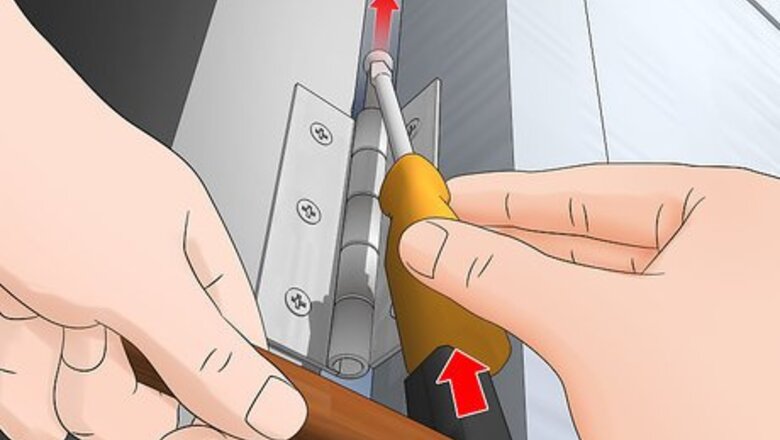
views
Stripping the Door
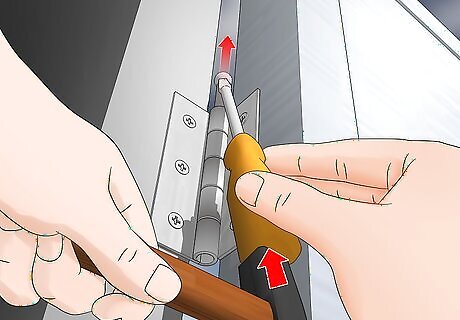
Loosen the hinge pins holding the door in place. Open your door as wide as possible to reveal the hinges holding it to the doorframe. Press a nail to the base of the hinge pin, which will be right on the point where the door pivots open and closed. Hit the nail with a hammer until the hinge pin loosens and the top is pushed away from the hinge panels. Repeat with any other hinges on the door. While taking the door off its hinges will make the painting process much easier, it isn’t absolutely necessary. If you live in a colder climate where it may take longer for the paint to dry, you should paint the door in its frame. Taking an external door out of its frame for several days is unsafe if you cannot control who or what could come inside your house. It might be safer to paint the door in its frame rather than leaving it off its hinges for several days while it dries fully.
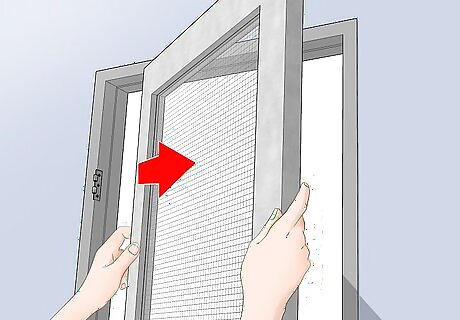
Pull the door out of the frame. Holding the door in place with one hand, use a flathead screwdriver to pry the hinge pins fully out of the door hinges. Carefully pull the door out of the doorframe and lay it on a flat surface or across two saw horses. Make sure you keep the hinge pins somewhere safe while you work on the door, although there should be replacements at your local hardware store if you lose them.
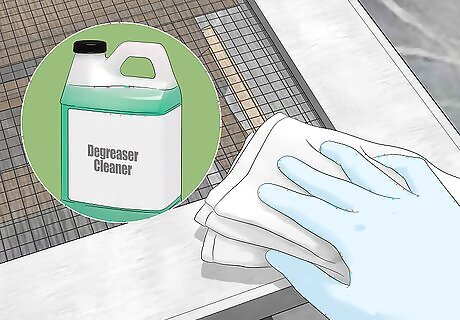
Wipe down the surface with a degreasing cleaner. In order to give the paint a smooth and clean surface to attach to, give the door a thorough clean with a degreasing cleaner and a rag. Be sure to remove any dirt, grease or grime from the surface of the door that could ruin your paint job or dirty your tools and brushes. Any multi-surface spray cleaner should work well on your door. Automotive degreasing cleaners are another great alternative if that's easier for you to find. Always follow the manufacturer's guidelines for the specific cleaner that you are using. Some may require you to wear gloves or eye protection for your own safety. Wipe down the door with a dry cloth or leave it in the sun for an hour or two before moving on.
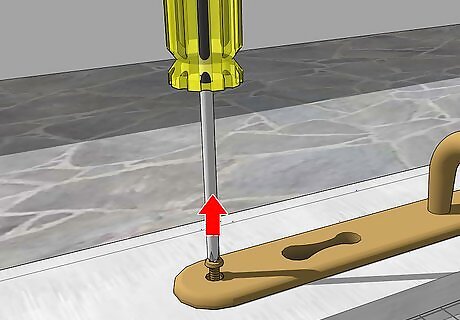
Remove all the hardware from the steel door. Using the appropriate screwdriver for each fitting, unscrew any hardware in the door that you don’t want to paint over. This might include the doorknob, strike plate, or a door knocker. Always use a screwdriver rather than an electric drill when removing hardware. It might take longer, but it will be much easier than having to replace any hardware you could damage with an electric drill. If there is any hardware you don't want to or cannot remove, cover it with painter's tape to prevent it from being painted.
Readying the Door for Painting
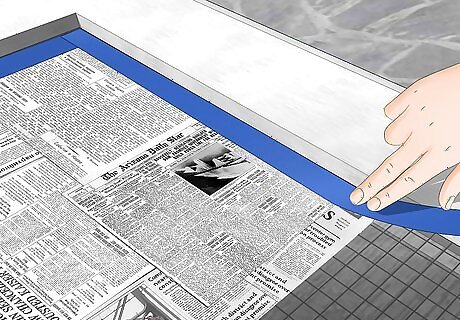
Tape off any areas that you don’t want to paint. Using a roll of painter’s tape, slowly work around the sides of the door and cover each edge. This will help keep the paint only on the face of the door and make the lines around each edge as clean as possible. Trimming the door with tape might be difficult around long or uneven edges, but it will make the painting process much easier in the long run. If there are any parts of the door you can’t remove, such as windows, you can cover these with painter’s tape to keep them clean.
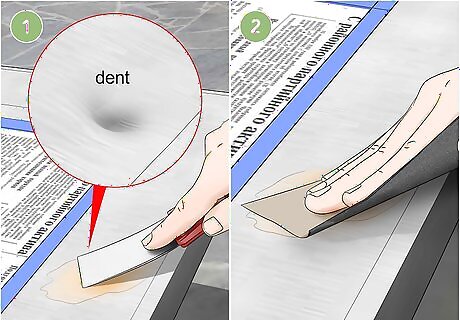
Fix any dents in the door's surface. Before painting the door, take the opportunity to fix any dents on the door’s surface. Use 80-grit sandpaper on any dented areas before smoothly covering the dent with a small amount of patching compound or auto body filler. Leave it to dry for around 40 minutes and then sand it with 150-grit sandpaper to make the area level with the rest of the door. Sand the door until the dent is no longer obvious or not easily visible. Painting over it will help obscure any minor dents or dings, so don't worry too much about using a bubble level
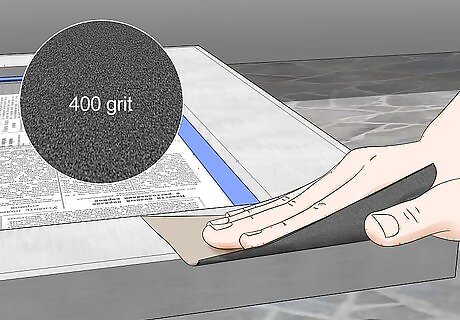
Sand the entire door with 400-grit sandpaper. To allow the primer and paint to adhere to the surface of the door, you should sand it down lightly first. Use fine grit sandpaper around 400 over the entire surface of the door. You don’t need to sand the whole surface of the door thoroughly, only enough to give the primer something to stick to. Applying too much pressure or using a rougher sandpaper can risk damaging the door too much.
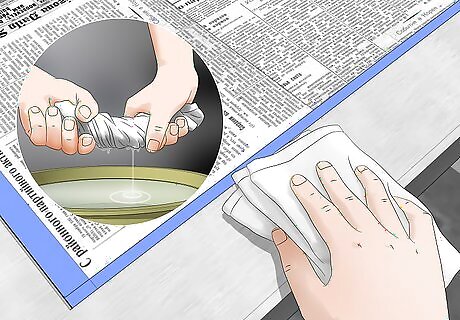
Wipe down the surface with a damp cloth. Sanding can create a lot of dust that can get caught in the paint and affect the look of your finished door. Slightly dampen a clean cloth and wipe down the surface of the door to remove any dust left over from sanding it down. If there is a lot of dust, or if the old paint has come loose in the sanding process, use a vacuum cleaner to remove the majority of the dust before wiping it down.
Resurfacing Your Door
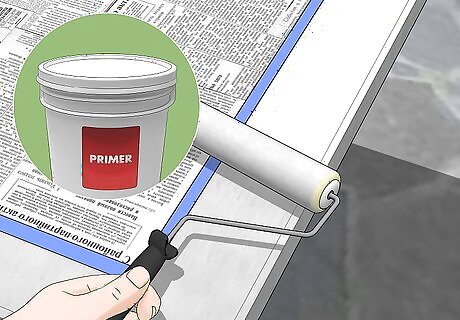
Prime the door with an oil-based primer. Priming the door with a product designed specifically for metal will keep your paint looking better for longer. Use a small paint roller to cover the door with two coats of primer, giving plenty of time for the primer to dry between coats. Make sure the primer you are using is compatible with your chosen paint. Each product should say which others they are compatible with, but you can ask for help when purchasing them if you’re unsure. Different primers will take different amounts of time to dry in different climates. It can take between 1 and 3 hours for each coat to fully dry. Give the door a light touch every hour until you are certain the door is dry. If painting both sides of the door, you'll need to work one side at a time. Apply both coats of primer to the door and let fully dry before turning over to prime the other side. If you use a Direct-To-Metal paint, you can begin applying it without applying primer to the door first. Always follow the manufacturer's instructions when painting with a specific product.
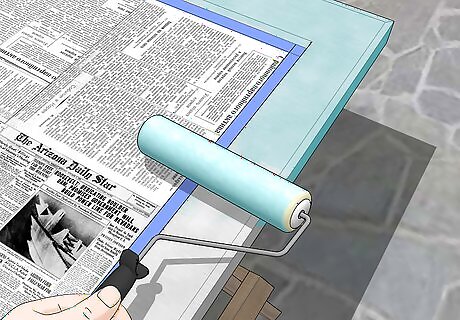
Use a roller to apply one coat of paint. Make sure that you are using a paint that is designed for exterior use, such as an exterior satin or semi-gloss paint. Use a brush to carefully paint any grooves or panels on the door, before painting the rest with a small roller. This will minimize the brush stroke marks on your door when it is finished. Be careful to fix any drips or uneven roller strokes before the paint dries. It might be easier to paint in the morning, early evening or in the shade, so the paint doesn’t dry too quickly and stays wet while you’re still painting. Give the door plenty of time to dry between coats, normally between 6 to 12 hours but sometimes up to 18. Check the information on your chosen paint for more information on the expected drying times. EXPERT TIP Sam Adams Sam Adams Professional Contractor Sam Adams is the owner of Cherry Design + Build, a residential design and construction firm, which has been operating in the Greater Seattle Area for over 13 years. A former architect, Sam is now a full-service contractor, specializing in residential remodels and additions. Sam Adams Sam Adams Professional Contractor Use a sprayer or rollers for uniform texture. Sam Adams, a full-service contractor, says: "The best way to paint a steel door is with a professional sprayer, not a rattle can. The second best way is to use foam rollers because both give your steel door a uniform texture. If you paint the door with a brush, you get all kinds of brush strokes in the finished product."
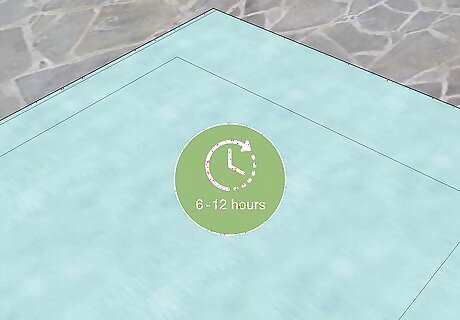
Give each side plenty of time to dry fully if you want to paint both sides of the door. Work one side at a time, as even slightly wet coats of paint can be damaged if they come in contact with another surface too quickly.
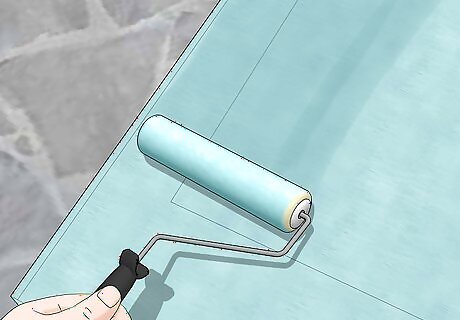
Apply a second coat of paint. Each coat of paint will improve the overall look of your door, as well as increasing its resistance to the elements. Give the first coat at least 6 hours to dry and then apply at least one more coat. Follow the manufacturer’s instructions when applying paints. They will likely tell you how many coats you’ll need, as well as how long you should leave each coat to dry. If you’re unhappy with the look of the second coat of paint once it is dry, you can always add another one.
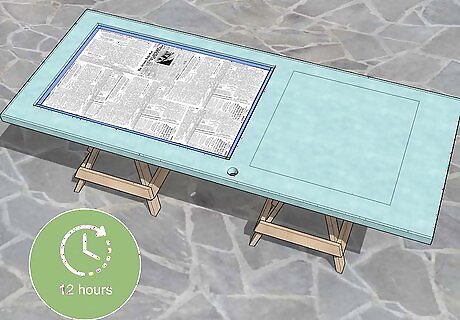
Let the paint dry completely. Give your final coat of paint plenty of time to dry before putting it back in place. If the paint is still a little wet, it may rub off on the doorframe and need repainting. Leave it for as long as possible, but normally at least 12 hours. Heat guns and similar tools might help the paint dry faster, but won't dry it evenly and could even damage the paint if it is too intense. If you use something to accelerate the drying, do so carefully.
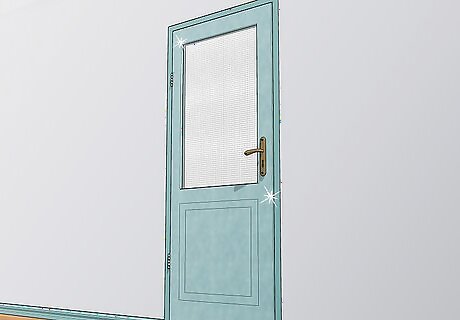
Reassemble the door and reattach it to the frame. Remove any painter’s tape you applied to the door when you began painting. Using a screwdriver, reattach any hardware you removed exactly as it was initially. Finally, put the door back on its hinges and reinsert the hinge pins with a hammer. You might want to remove the weather stripping around the edge of the doorframe for a day or two after reattaching the door. This will give the paint much longer to dry fully before the edges are pressed tightly against the stripping.




















Comments
0 comment